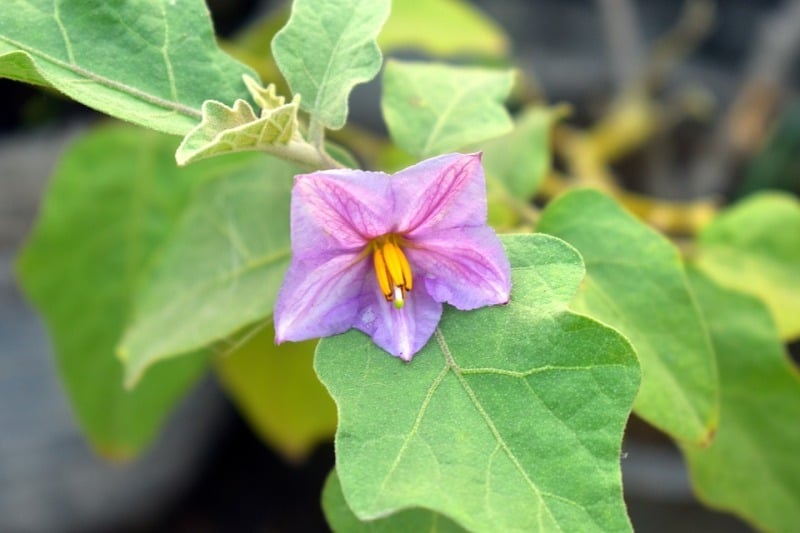A step by step guide for growing eggplants hydroponically
Today, what we are discussing is about growing eggplants hydroponically (brinjal) along with a required hydroponic nutrient solution, seed germination process of hydroponic eggplant, harvesting procedure of hydroponics eggplant. Eggplants or Brinjal are a member of the tomato family Solanaceae. A native of the subtropical areas of Asia, eggplants have been grown for many centuries and are now grown all over the globe as a commercial crop. Eggplants are typically a perennial, but under hydroponic gardening, they are usually cultivated as annual bushes requiring high levels of winter heating to keep up growth and yields.
What is captivating about eggplants is the extensive variety of types and cultivars available. Its fruits range from tiny, green/white round, to golden, egg-shaped, elongated pink/purple Japanese types, to long, black or white teardrops, all with a subtle but characteristic flavor. It is related to tomatoes, and a member of the nightshade family. A native of sub-continental India, the eggplant loves the warm temperature, in fact, it needs a warmer climate than tomatoes to actually flourish and be productive – which is the major reason that it readily disappoints many outdoor grower year after year. Unlike tomatoes, it is also a very slow-growing plant. Eggplants, with dramatic foliage and colorful fruit, are not only a great choice for a veggie garden, but an ornamental specimen as well.
Seed germination of eggplants in hydroponics
Brinjal can be propagated in the hydroponic system using Eggplant seeds. Seeds sprout best at temperature 70°to 90°Farhenheit and you will have to sow more than you want because the germination rate in eggplant isn’t 100%. The ideal temperature range for vegetative and flower to fruit stages is 75 to 85 Fahrenheit. If the temperature reaches 95 Fahrenheit, fruiting will stop and flowers will drop off or lose their ovaries. Night temps should not drop below 65Fahrenheit. Relative humidity should be 65 to75% with media moisture level maintained at 80% (85% during fruiting). At optimal conditions, the growing eggplant seedlings will emerge in seven to 10 days after sowing. Two weeks after sprouting, fertilize the seedlings once in a week with a soluble fertilizer. Eggplant seedlings will be prepared for transplanting in six to eight weeks.

You may also check Growing Okra in Hydroponics.
Choose a hydroponic system for eggplants
As with any kind of plant, you have to make a decision about how you want to do hydroponics. Do you want an ebb and flow or NFT system where nutrient-enriched water simply passes by developing plant roots? Or do you want a deepwater culture system where plant roots sit in the nutrient-enriched water constantly?
There’s no single magic bullet for growing eggplants even it is compatible with almost all hydroponic systems same as okra hydroponics. The only recommendation is that if you decide to go with deepwater culture, have equipment installed to oxygenate the water well so that there is no accumulation of salts which will cause stress in developing affecting hydroponic eggplant yield.
Hydroponics nutrients for eggplants
Eggplants require nitrogen, phosphorus, and potassium, as well as some other trace elements for their regular growth. You can find the ready-mix hydroponic nutrient formula on the market and in various online sites that will be just fine for eggplants you just have to follow the instructions mentioned on the packet clearly. Friends you don’t need to be a chemist to start growing plants in the hydroponic system just take a look at what’s on the packet and ensure it is optimized for your particular crop. Eggplants have similar nutritional needs as other fruiting crops such as hydroponic melons. Ideally, plants have to be started on a balanced grow or vegetative formulation and then switched to a fruiting formulation with a higher potassium level once the first fruits have appeared.
Lighting for growing eggplants hydroponically

Get sufficient light to grow either placing your system on a place which receives adequate direct sunlight as per plant’s requirement or using grow lights with enough luminosity and intensity to help plants grow well. Experienced growers recommend at least eight hours of light per day is necessary for hydroponic eggplants.
You should not miss Growing Saffron Hydroponically.
Temperature for growing eggplants hydroponically
Basically, eggplants like it warm surroundings. You can maintain the temperature in the range of 70 to 80°F or even above. But make sure temperatures don’t go below 65°F because the plants typically don’t do well in these cooler temperatures.
pH level: 5.5 to 6.0
PPM: 1750-2450
Supplementary pollination in hydroponic eggplant:
While the plants are self-fertile or autogamous, offering some assistance in pollination by brushing pollen between flowers with a small paintbrush will facilitate increased fruit set. Outdoors you have bees and butterflies that can take care of this, but indoors pollination must be supplemented by you. Simply shake the plant every day when flowering begins.
Harvesting of hydroponic eggplants
A member of the nightshade family and a relative of tomatoes, the appearance of the fruit skin can direct you about the right time for picking an eggplant. Its skin should be glossy and thin. Eggplant harvest may start when the fruits are developed and small, but growing fruits to its full size before harvesting eggplants results in the development of more fruit. Harvesting eggplants should be done when the inner flesh is creamy in color, fruits are firm and obviously before seeds are visible. Learning when to harvest eggplants may require cutting into the fruit to check the color of the flesh and the size of its seeds. Another easy method to determine eggplant fruit for maturity, press the fruit with your thumb; if the flesh bounces back its green and not ripened; if your thumb leaves an indentation, the fruit is over-ripened; the best tasting eggplant will be in between.
You better check Growing Leeks from Seed, Roots.
Once you’ve determined that it is the right time to start the eggplant harvest, wear gloves and long sleeves, as the eggplant stem bears prickles, which can irritate the skin. Whenever you are harvesting eggplants, treat the fruit gently, as it bruises very easily. Harvesting eggplants also include cutting a short piece of stem above the calyx (cap) intact and attached to the top of the fruit which is also a key character of Solanaceae family. Prefer using pruners or a sharp knife.
Eggplants are a versatile crop that can be an actual winner in any of the hydroponic systems. As you can see from the above discussion, it’s not too different to start growing these on your own and making them part of your garden. With some relatively simple hydroponic equipment, you can set up a new hydroponic garden that is less labor-intensive and giving organic eggplant, to really benefit from this kind of innovative gardening.
That’s all folks about hydroponic eggplants details, keep growing veggies in hydroponics without soil.
You may also like Organic Food Cultivation, Farming Methods.